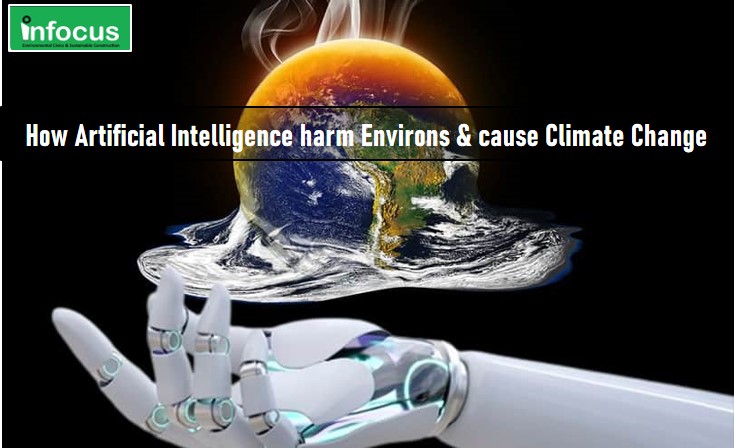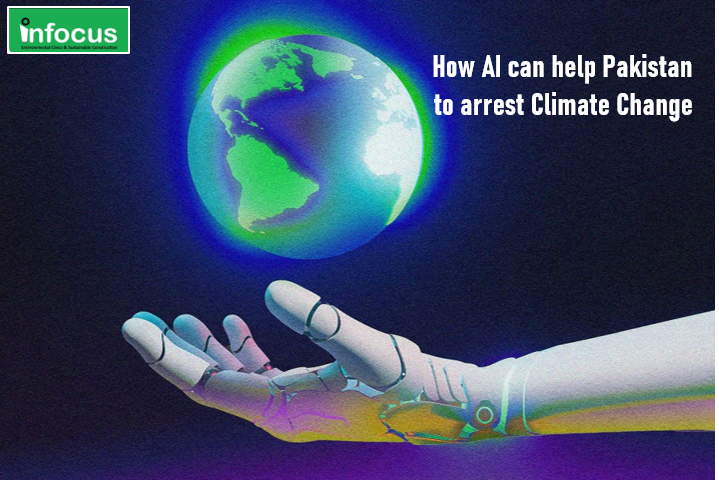In an earlier blog, it was pointed out how excessive use of Artificial Intelligence (AI) is causing more emission and damaging global environment. However, if use wisely and adequately, developing nation like Pakistan benefits from artificial intelligence massively to arrest climate change. Climate change is one of the most pressing challenges facing Pakistan today. From devastating floods to record-breaking heatwaves, the country is highly vulnerable to the effects of global warming. In this critical fight for a sustainable future, Artificial Intelligence is emerging as a powerful tool to help Pakistan monitor, mitigate, and adapt to climate change more effectively.
Artificial Intelligence & Climate Change
Climate change is a big threat, which affects nature, economies, and health. That’s why new technologies are needed that could help reduce these effects. Among these technologies, artificial intelligence is an important tool that provides new methods for understanding and tackling climate issues. For example, AI can better predict droughts, floods, and wildfires, helping governments and organizations to take early steps to safeguard at-risk communities and infrastructure. Another important role of AI in combating climate change is optimizing energy use. Industries and homes release a lot of greenhouse gas (GHG) emissions because of poor energy management.

Below are major benefits of AI as far as far as environment and climate change are concerned:
- Predictive Weather Models and Early Warning Systems
One of the most immediate ways AI is helping Pakistan tackle climate change is through predictive weather modeling. Using machine learning algorithms trained on historical climate data, AI systems can now forecast extreme weather events such as floods, droughts, and heatwaves with greater accuracy. This enables early warning systems to alert communities in high-risk areas, giving them valuable time to prepare and evacuate if necessary.
For instance, during the 2022 floods, real-time satellite imagery combined with AI-driven predictive analytics could have significantly improved disaster response. Going forward, AI-powered warning systems can play a crucial role in minimizing loss of life and property.
- Smart Agriculture for a Climate-Resilient Future
Agriculture is the backbone of Pakistan’s economy and also one of the sectors most affected by climate change. AI is helping transform traditional farming into smart agriculture by analyzing soil health, predicting crop yields, and optimizing irrigation. With AI tools, farmers can make data-driven decisions that increase productivity while conserving water and reducing the use of harmful fertilizers and pesticides.
Projects using AI to monitor crop health via drones and satellite imagery are already underway in parts of Punjab and Sindh. These initiatives not only improve food security but also reduce the sector’s environmental footprint.
- Forest Conservation and Reforestation
Pakistan has launched large-scale reforestation programs like the Billion Tree Tsunami, but monitoring such initiatives over vast terrains is a challenge. AI and remote sensing technologies make it possible to track tree growth, illegal logging, and forest health using satellite data. This ensures better transparency, accountability, and efficiency in conservation efforts.
- Urban Planning and Energy Efficiency
Rapid urbanization is contributing to higher emissions in Pakistani cities. AI can optimize urban planning by modeling traffic flow, improving public transportation, and reducing energy consumption in buildings. AI-based energy management systems help monitor and reduce electricity use, lowering both costs and emissions.
Moreover, integrating AI with renewable energy systems like solar and wind can help predict energy demand and supply fluctuations, making clean energy more reliable and efficient.
As a whole, artificial intelligence is not a silver bullet, but it offers a powerful set of tools to help Pakistan fight climate change. By leveraging AI for climate forecasting, sustainable agriculture, forest management, and urban planning, Pakistan can build a more resilient and greener future. As technology continues to evolve, the integration of AI into climate strategies will be key to protecting both people and the planet.
By
Editorial, Infocus


